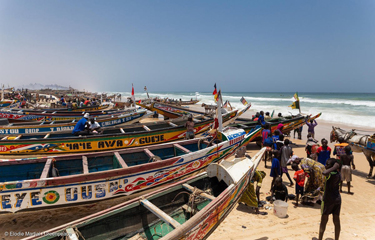Mauritania has submitted a report as part of the Fisheries Transparency Initiative (FiTI), aiming to achieve greater transparency and accountability in the nation’s fisheries sector.
In a press release, FiTI said Mauritania’s issuance of the report “marks an important step to enhancing the public availability of credible fisheries management information.”
FiTI is a global standard for establishing sustainable fisheries management through transparency and multi-stakeholder participation. The Seychelles became the first country to submit a full report last month.
Although Mauritania has an estimated 600 fish species, just around 200 species are commercially exploitable, and the West African country has battled illegal, unreported, and unregulated (IUU) fishing for years.
“Over the years the country’s fisheries sector has been characterized by a lack of transparency on basic information, such as the status of fish stocks, foreign fishing access agreements, or the number of vessels authorized to fish in Mauritania’s jurisdictional waters,” FiTI’s statement said.
Previously, Mauritania received critical attention after the world’s second-largest fishing vessel with “a bad track record for chronic overfishing” was spotted fishing in the country’s waters, according to FiTI.
Greenpeace, an NGO, said in late March the vessel, FV Margiris, a Lithuania-flagged supertrawler, has capacity to catch and freeze 250 tons of fish per day but is notorious for “targeting small pelagic fish already heavily overfished in West Africa and vital to food security of millions of people in the region.”
The overfishing, the NGO said, leads to immense environmental damage to fish stocks and biodiversity and the supertrawler, Margaris “uses a net larger than a soccer field and has a storage capacity of 6,000 tons,” Greenpeace Africa Political Adviser Aliou Ba said.
“This vessel is a real ‘monster’ and a threat to already overfished pelagic resources,” Ba said
Mauritania’s report to FiTI contains information for 2018 that includes details on fishing agreements it has signed with Japan Tuna Fisheries Coopérative Association, Senegal, and Poly Hong Dong Pelagic Fishery Co., which operates a USD 200 million (EUR 171.5 million) fishing base in Nouadhibou, Mauritania.
The information also lists 452 large-scale fishing vessels authorized to fish in Mauritania’s jurisdictional waters and estimates the total numbers of small-scale vessels in Mauritania at 6,809, employing 24,984 small-scale fishers.
The report also contains an assessment on Mauritania’s compliance levels against the first six transparency requirements of the FiTI Standard, in addition to providing at least 15 recommendations to Mauritanian authority on how to improve transparency in its fisheries management.
FiTI lauded Mauritania for producing the report despite facing constraints arising from the COVID-19 pandemic. The report was produced through a collective effort by Mauritania’s National Multi-Stakeholder Group and its credibility “has enhanced by the inclusivity of the process that brought together a team of 30 people made up of representatives from government, fishing industry, and civil society,” FiTI said.
“This is not only in line with the United Nations Sustainable Development Goal 17, but also a prerequisite in order to ensure that the report is seen as credible and trustworthy,” FiTI statement said.
Photo courtesy of Greenpeace







